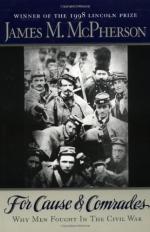
|
| Name: _________________________ | Period: ___________________ |
This quiz consists of 5 multiple choice and 5 short answer questions through Chapter 2, We Were in Earnest.
Multiple Choice Questions
1. As McPherson discusses the officer in the 4th Alabama, who was determined to fight a "black republican" leader, he reveals that leader is what relation to him?
(a) Grandson.
(b) Brother-in-law.
(c) Uncle.
(d) Cousin.
2. When discussing the movie "Gettysburg" and the novel "The Killer Angels," McPherson mentions which man who won the medal of honor for defending Little Big Top?
(a) Charles Evans Roberts.
(b) Joshua Lawrence Chamberlain.
(c) William E. Miller.
(d) Henry J. Minnigh.
3. According to the quote from John W. DeForest in "Chapter 1: This War is a Crusade," the man who does not dread to die or be mutilated is a what?
(a) Young.
(b) Hero.
(c) Religious.
(d) Lunatic.
4. As McPherson discusses the initial impulse that prompted men to enlist on both sides after the raid on Fort Sumter he references which of the following French terms?
(a) Folie.
(b) Rage militaire.
(c) Combattre pret.
(d) Vide en haut.
5. In the story of James and John Welsh, McPherson says that John--who enlisted with the 27th Virginia--was killed during which of the following battles?
(a) Shiloh.
(b) Gettysburg.
(c) Bull Run.
(d) Chancellorville.
Short Answer Questions
1. While talking about historically and politically famous individuals who fought the Civil War, McPherson mentions which of the following Ohio Republican leaders?
2. When discussing various war memoirs, McPherson mentions that James Gooding, a black soldier in the 54th Massachusetts, wrote which of the following?
3. When discussing various war memoirs, McPherson mentions that John Haley of Maine wrote which of the following?
4. As the book opens, McPherson says that he took some Princeton students to Gettysburg in the spring of what year?
5. When an immigrant worker in a Philadelphia textile mill wrote to his father to explain his enlistment, he said if secession were allowed, the United States might end up worse than what country?
|
This section contains 336 words (approx. 2 pages at 300 words per page) |

|




